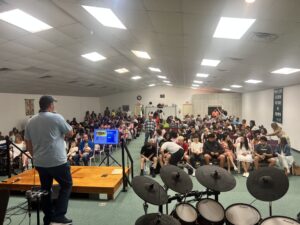
WASHINGTON (BP)–The U.S. Supreme Court has agreed to render decisions this term on two of the most controversial issues in society: abortion and homosexual rights.
The high court announced Jan. 14 it would review lower-court rulings on a state’s ban on partial-birth abortion and the Boy Scouts’ prohibition against homosexual troop leaders. Oral arguments in both cases have not been scheduled but reportedly will be in April. Opinions are expected to be released before the term’s summer adjournment.
Federal courts of appeals have issued conflicting decisions on the constitutionality of state bans on partial-birth abortion, a grisly procedure involving a nearly totally delivered baby. The Supreme Court agreed to review a decision by the Eighth Circuit Court of Appeals striking down a Nebraska partial-birth ban.
The high court also accepted a case from the New Jersey Supreme Court on whether the Boy Scouts could exclude homosexuals from serving as leaders. The state court ruled last year the Scouts’ policy unlawfully discriminates on the basis of “sexual orientation.”
Southern Baptist ethics agency head Richard Land especially was pleased the Supreme Court accepted the Boy Scouts case. Observers took for granted the justices would have to accept a partial-birth abortion case soon, given the conflicting rulings in lower courts.
“I’m delighted first that the court has agreed to take the [Boy Scouts] case, because there was no guarantee that they would,” said Land, president of the Ethics & Religious Liberty Commission. Allowing the New Jersey decision to stand could have been “extremely detrimental not only to the Boy Scouts but to every private, charitable organization in the United States, including churches and religious organizations,” Land said.
“The fundamental point at issue is whether or not private organizations, including churches and religious organizations, have the right to determine the moral requirement for their leadership,” Land said. “The New Jersey Supreme Court says no. We say yes they must, or else they lose control of their own moral message. In other words, the Boy Scouts have the right to determine what moral requirements are necessary in its leadership to produce boys of good character, just as religious organizations and other private organizations have the right to determine those requirements for themselves without the intrusion of government. To say otherwise is a manifest denial of free exercise.”
The ERLC signed on to a brief by the American Center for Law and Justice asking the high court to accept the case. It also will join a brief asking the court to overturn the New Jersey ruling.
Jay Sekulow, the ACLJ’s chief counsel, said, “This is a watershed case that could ultimately determine the future of many private organizations that set their own leadership standards.” The case “represents the Boy Scouts’ last and best chance to defend its time-honored traditions and define its leadership criteria — something it should be permitted to do under the First Amendment,” Sekulow said.
Concerning the other case, the Eighth Circuit Court of Appeals struck down partial-birth abortion bans in not only Nebraska but Arkansas and Iowa as well in September. A month later, the Seventh Circuit upheld similar bans in Illinois and Wisconsin.
“Along with most Southern Baptists and a clear majority of Americans, I hope and pray that the Supreme Court takes this opportunity to uphold the constitutionality of laws that ban partial-birth abortion,” Land said, calling it “a euphemism for infanticide.”
“Often the babies that are killed through this barbaric procedure are survivable outside the womb if they are cared for as a human being instead of a problem to be eliminated,” Land said. “Many people who are pro-choice … oppose partial-birth abortion and equate it morally with infanticide.”
The procedure prohibited by the bans reached public awareness in the early 1990s and is typically performed in the fifth or sixth month of pregnancy. As practiced by some abortion doctors, it involves the delivery of an intact baby feet first until only the head is left in the birth canal. The doctor pierces the base of the baby’s skull with surgical scissors, then inserts a catheter into the opening and suctions out the brain. The collapse of the skull enables easier removal of the dead child.
Though 27 states have passed partial-birth prohibitions, only eight were in effect before the Seventh Circuit’s decision. Nearly all of the others have been struck down or blocked by courts. The bans in effect are in Indiana, Mississippi, North Dakota, Oklahoma, South Carolina, South Dakota, Tennessee and Virginia, according to the National Right to Life Committee.
In September, the Senate passed a federal ban on the procedure. The 63-34 vote was the third time senators have approved the measure. President Clinton vetoed the bill the two previous times. He is expected to again if the House of Representatives passes the bill, as it appears it will this year.
Both times before, the House gained the two-thirds majority necessary to override a veto, but the Senate fell short, the last time by three votes. This year’s Senate vote again fell short of a veto-proof majority.
Land called for Southern Baptists and other Americans to pray for wisdom for the nine justices as they consider both cases.















